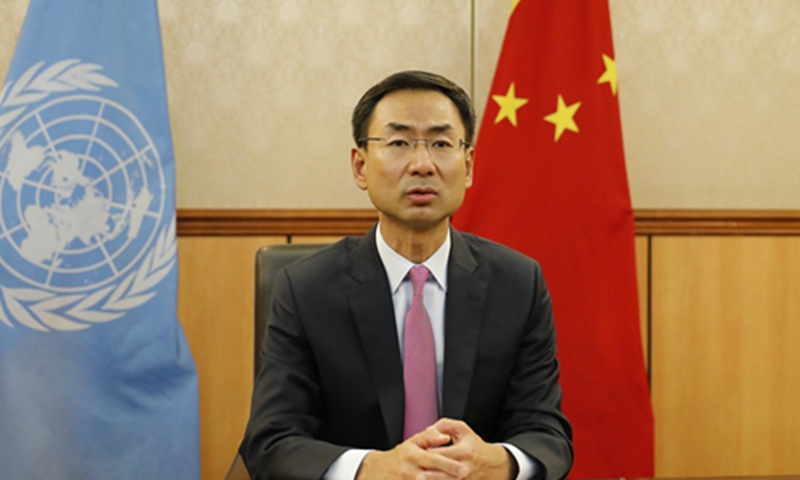
Geng Shuang, China's deputy permanent representative to the UN. Photo: Foreign Ministry official website
China supports the establishment of a Middle East zone free of nuclear weapons and other weapons of mass destruction and believes that this move will help curb the proliferation of weapons of mass destruction, safeguard the authority and effectiveness of international non-proliferation regimes, and reduce the risk of an arms race and conflict, thereby providing an important mechanism for the maintenance of long-term regional peace and security, China’s deputy permanent representative to the United Nations Geng Shuang said in remarks at the Fourth Session of the Conference on the Establishment of a Middle East Zone Free of Nuclear Weapons and other Weapons of Mass Destruction on Monday.
According to Geng, there have been three successful sessions of this conference which is taking place at a time when the Palestinian-Israeli conflict is intensifying.
Given the current context, the international community should make greater efforts to support the establishment of a Middle East zone free of nuclear weapons and other weapons of mass destruction, which is of great urgency and relevance in facilitating reconciliation and cooperation among regional countries in the Middle East and advancing the Middle East peace process, Geng said.
Geng noted that peace and security in the Middle East impacts not only the interests of regional states, but also global stability. In response to the current global and regional security dilemma, China maintains that the international community should adhere to the concept of common, comprehensive, cooperative and sustainable security, insist on building a balanced, effective, and sustainable international security architecture, and adhere to a new path to security that features dialogue over confrontation, partnership over alliances, and win-win over zero-sum. This is one of China’s main areas of focus in eliminating the root causes of international conflicts and achieving durable stability and security in the region.
According to Geng, the Middle East question, with its intertwined historical and practical contradictions, cannot be resolved overnight. It requires all parties to uphold the concept of common security, adhere to the principle of indivisibility of security, and gradually shape a favorable political and diplomatic atmosphere. Countries in the region should strengthen their solidarity and coordination and forge mutual trust and consensus.
Certain country outside the region should abandon their narrow geopolitical interests and political manipulation, stop deliberately provoking confrontation in the region, and make practical contributions to the maintenance of regional security, Geng said.
Maintaining the authority and effectiveness of the international nuclear non-proliferation regime is crucial to the establishment of a nuclear weapon free zone in the Middle East. The countries of the region concerned should accede to international conventions such as the Treaty on the Non-Proliferation of Nuclear Weapons (NPT), the Chemical Weapons Convention (CWC), and the Biological Weapons Convention (BWC) as soon as possible and should strictly abide by their treaty obligations, Geng said.
Recently, comments by Israeli officials on the use of nuclear weapons in the Gaza Strip caused an uproar. China was shocked by statements and expressed concern. The Israeli statements were universally condemned. It is extremely irresponsible and disturbing. Such statements run counter to the international consensus that a nuclear war cannot be won and must not be fought, on contrary to the international spirit of establishing a Middle East zone free of nuclear weapons, and go against the overwhelming international call to deescalate, cease hostilities, and protect civilians, Geng noted.
China urges Israeli officials to retract these statements, and we urge Israel to accede to the treaty on the non-proliferation of nuclear weapons as a non-nuclear weapon state as soon as possible and to place all its nuclear facilities under IAEA safeguards, Geng said.
According to Geng, China firmly commits to a nuclear strategy of self-defense. Since it first acquired nuclear weapons, China pledged not to use nuclear weapons first at any time or under any circumstances, and not to use or threaten to use nuclear weapons against non-nuclear weapon states and nuclear weapon free zones unconditionally. It is the only nuclear weapon state to have made the above commitments.
China advocates that pending the complete prohibition and thorough destruction of nuclear weapons, all nuclear weapons states should undertake not to be the first to use nuclear weapons and not to use nuclear weapons against non-nuclear weapon states and nuclear weapon free zones, Geng said.
Meanwhile, special Envoy of the Chinese Government on the Middle East Issue Zhai Jun met with Turkish Foreign Minister Hakan Fidan and exchanged opinions on the Israel-Palestine conflicts during a visit in Türkiye on Monday.
According to Zhai, the international community should take prompt action and seek an immediate ceasefire to prevent the situation from further deterioration or risk the situation getting out of control, urge the conflicting parties to strictly adhere to international humanitarian law, exert every effort to protect civilians and prevent a larger-scale humanitarian disaster, and intensify diplomatic efforts to bring the crisis back to the track of political resolution.
Türkiye serves an influential power as a Middle Eastern and Islamic country. China is willing to strengthen communication and coordination with Türkiye, working together with Türkiye to contribute efforts toward a comprehensive, just and long-lasting solution to the Palestinian issue, Zhai said.
Global Times




